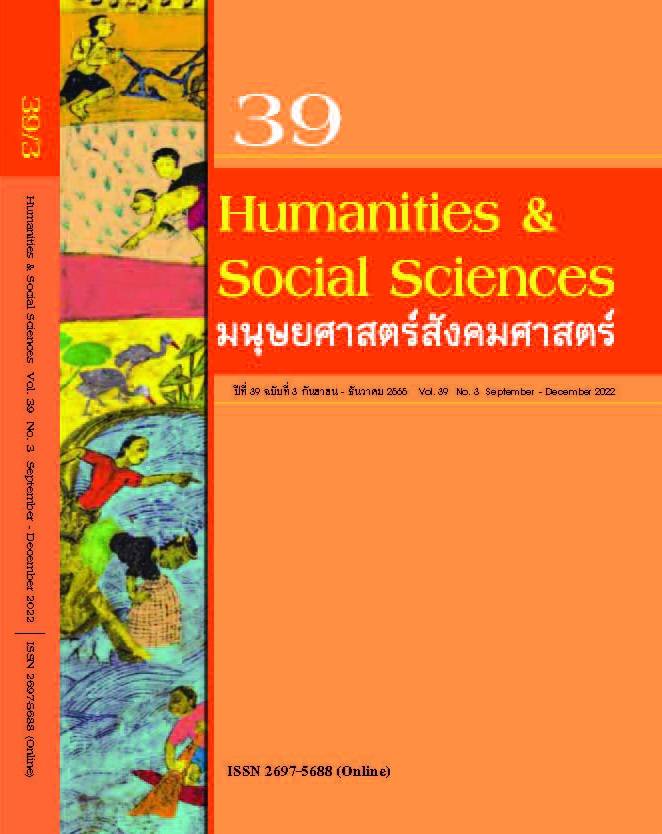สำรวจแนวคิด “พลเมือง” ในโลกสมัยใหม่ : พรมแดน อำนาจอธิปไตย และการอยู่ร่วมกันบนความหลากหลาย
Exploring the notion of ‘citizenship’ in the modern world:borders, sovereignty and coexisting in diversity
Keywords:
Keywords : Citizenship, Migrant, Territoriality, CosmopolitanismAbstract
บทคัดย่อ
ในบริบทโลกยุคโลกาภิวัตน์ปัจจุบัน ที่นำความเปลี่ยนแปลงในระดับข้ามชาติให้เกิดขึ้นอย่างรวดเร็วทั้งในทางเศรษฐกิจ การเมือง สังคมวัฒนธรรม รวมถึงการอพยพเคลื่อนย้ายข้ามชาติของผู้คนเองก็ได้กลายมาเป็นสิ่งที่ไม่อาจหลีกเลี่ยงได้ การอพยพเคลื่อนย้ายข้ามพรมแดนรัฐ-ชาติเช่นนี้กลายเป็นประเด็นปัญหาที่ท้าทายนิยามความหมายของ“พลเมือง” และการบริหารจัดการของรัฐที่มีต่อคนกลุ่มนี้
บทความชิ้นนี้พยายามที่จะสำรวจแนวคิดว่าด้วย “พลเมือง” (citizenship) ภายใต้กรอบแนวคิดเสรีนิยมประชาธิปไตย ซึ่งนอกจากจะทำความเข้าใจแนวคิดเรื่องพลเมืองที่หลากหลายที่ถูกนำเสนอและเผยแพร่ในวงวิชาการแล้ว ยังมุ่งที่จะชี้ชวนให้เห็นถึงข้อจำกัดของเกณฑ์ของรัฐในการกำหนดนิยามว่าใครมีคุณสมบัติเป็น “พลเมือง” ยิ่งไปกว่านั้นงานชิ้นนี้พยายามที่จะตั้งคำถาม (problematize) ถึงนิยามและเกณฑ์ดังกล่าวว่าเพียงพอหรือไม่ในการทำความเข้าใจและรับมือกับสภาวการณ์โลกร่วมสมัยที่ผู้คน ทุน และวัฒนธรรม ล้วนแต่เคลื่อนย้ายตัดข้ามพรมแดนทางภูมิศาสตร์ของรัฐ-ชาติ ขณะที่สถานะของคนกลุ่มนี้ในบางลักษณะถูกยอมรับให้มีสถานะเป็นพลเมืองผ่านนโยบายทวิพลเมือง (dual citizen) ในบางประเทศ แต่ในบางลักษณะการดำรงอยู่ของพวกเขา/เธอก็ไม่ถูกรับรู้ ทำให้ในทางปฏิบัติสถานะความเป็นพลเมืองของผู้คนเหล่านี้ยังไม่ถูกยอมรับให้เป็นส่วนหนึ่ง (belongingness)[1] ของสังคมที่เข้าไปอยู่อาศัยอันเนื่องมาจากความแตกต่างทางประวัติศาสตร์ ศาสนา หรือชาติพันธุ์ เป็นต้น
แม้ว่าการผนวกรวมผู้อพยพเข้าเป็นส่วนหนึ่งของรัฐ ผ่านการให้สถานะพลเมืองตามกฎหมาย จะเป็นเรื่องยาก แต่การผนวกรวมผู้อพยพในทางสังคมอาจจะเป็นอีกแนวทางหนึ่ง ผู้เขียนจึงเสนอว่า การเข้าใจความเป็นพลเมืองผ่านมุมมองแบบคอสโมโพลิแทน (cosmopolitanism) นั้นช่วยให้ชุมชนปลายทางที่รับผู้อพยพมีวิธีการอันมีศักยภาพในการผนวกรวมเอาผู้อพยพข้ามชาติเข้ามาเป็นส่วนหนึ่ง เช่นเดียวกับเอื้อให้เกิดเงื่อนไขอันเหมาะสมในการเกิดความรู้สึกเป็นส่วนหนึ่งในหมู่ผู้อพยพด้วย
คำสำคัญ: ความเป็นพลเมือง, ผู้อพยพ, เขตแดน, คอสโมโพลิแทน
Abstract
In the context of the globalized world, transnational transformations have contributed to rapid economic, social, cultural, and migratory changes. As a result, transnational migration has become an inevitable social phenomenon. Simultaneously, transgressing nation-states’ boundaries has brought about a new challenge to the existing definition of ‘citizenship’ and ways of managing such people.
This article aims at exploring the concept of ‘citizenship’ through a liberal democratic framework. In doing so, the article will: (1) try to understand various conceptions of citizenship represented and propagated in academia; (2) point out the limitations of state-centric definitions and qualifications of citizenship; (3) problematize whether such definitions and qualifications are sufficient in understanding and dealing with the contemporary world conditions in which people, capital, and cultures transverse across nation-states’ geographical boundaries. This article argues that while some countries grant these transnational migrants some legal status through a dual-citizenship policy, these people’s existence has not been perceived socially and politically. Practically speaking, these transnational migrants’ distinctive historical, religious, and ethnological differences render their citizenship status never truly belong to the host countries.
This article argues that although integrating transnational migrants to become part of a nation-state is inherently difficult, integrating them socially could be a more viable and promising alternative. The author proposes that understanding transnational migrants through a cosmopolitan perspective could equip a host society with a potential way in integrating such transnational people to be part of the society as well as allow suitable conditions for these people to belong to the society.
Keywords: citizenship, migrant, territoriality, cosmopolitanism
References
เอกสารอ้างอิง
ธงชัย วินิจจะกูล .(2559). ประวัติศาสตร์การสร้าง “ตัวตน”.ใน โฉมหน้าราชาชาตินิยม : ว่าด้วยประวัติศาสตร์
ไทย. กรุงเทพฯ : สำนักพิมพ์ฟ้าเดียวกัน.
สุเทพ คำเมฆ และพรอัมรินทร์ พรหมเกิด. (2565). การศึกษาความเป็นพลเมืองผ่านมุมมองทางสังคมวิทยา
การเมือง. จันทรเกษมสาร , 28 (1),78-92.
สำนักงานเลขาธิการสภาผู้แทนราษฎร (2558). ความเป็นพลเมืองในวิถีระบอบประชาธิปไตย. กรุงเทพฯ :
สำนักการพิมพ์ สำนักงานเลขาธิการสภาผู้แทนราษฎร.
Agamben ,Giorgio. (2000). Means without end : Notes on Politics. Vincenzo Binetti and Cesare
Casarino (Translated). Minneapolis: University of Minnesota Press.
Agamben, Giorgio. (2005). State of Exceptions translated by Kevin Attell.The University of
Chicago press
Anderson, Benedict R.O. (2006). Imagined Communities : Reflections on the origin and spread of
nationalism. London , New York: Verso.
Appadurai, A. (1996). Sovereignty without territoriality: Notes for a postnational geography. The
geography of identity, 40-58.
Appiah ,Kwame. (2006). Cosmopolitanism: Ethics in a World of Strangers. New York:
W.W. Norton & Co.
Barbalet, J.M. (1998). Citizen : Rights, struggle and class inequality (Concepts in Social
Sciences). Milton Keynes : Open University Press.
Bauböck, Rainer (1994). Transnational Citizenship. Membership and Rights in International
Migration. Aldershot, UK: Edward Elgar Publishing.
Benhabib,Seyla. (2005). Borders, Boundaries, and Citizenship. PS: Political Science and
Politics 38(4), 673-677.
Falk ,Richard (2021). The Life of a Citizen Pilgrim. Atlanta: Clarity Press
Held ,David.(2003). Cosmopolitanism: Globalisation tamed? Review of International Studies
, 465–480.
Marshall, T.H. (1994). Citizenship andsocial class.In Turner, Bryan S. & Hamilyon, London;
New York: Routledge.
Mouffe ,Chantal. (2000) The Democratic Paradox. London : Verso.
Ong , Aihwa (1999). Flexible Citizenship : The cultural logics of Transnationality. Duke
University Press.
Ong , Aihwa. (2005). (Re) Articulations of Citizenship. PS: Political Science and
Politics 38 (4), 697-699.
Procacci, G. (2004). Governmentality and Citizenship. In Kate Nash and Alan Scott (Eds.), The
Blackwell companion to political sociology, Milan: Blackwell Publishing Ltd.
Rhacel Salazar Parreñas. (2001). Servants of Globalization: Migration and Domestic Work.
Stanford University Press.
Schmitt ,Carl. (1996). The Concept of the Political (translated by George Schwab) .University of
Chicago Press.
Oldfield. Adrian.(1994). Citizenship: An Unnatural Practice? In Citizenship : Critical Concept.
Bryan S. Turner. Peter Hamilton. Edited. London and New York :Rouledge ,188-198.
Pappa, Norris. (2001). Global Governance and Cosmopolitan Citizens. In Governance in a
Globalizing World. Edited by Joseph S. Nye, Jr. and John Donahue. Brookings
Institution, 2001, 155-177.
Prem Kumar Rajaram and C. Grundy – Warr. (2007). Borderscapes: Hidden Geographies and
Insurrectionary Politics at Territory’s Edge. NED-New edition, vol. 29, University of
Minnesota
Riva Kostoryane. (2005). Citizenship,Nationhood, and Non-territoriality :Transnational
Participation in Europe. PS, Political Science & Politics, 38(4), 693-696



